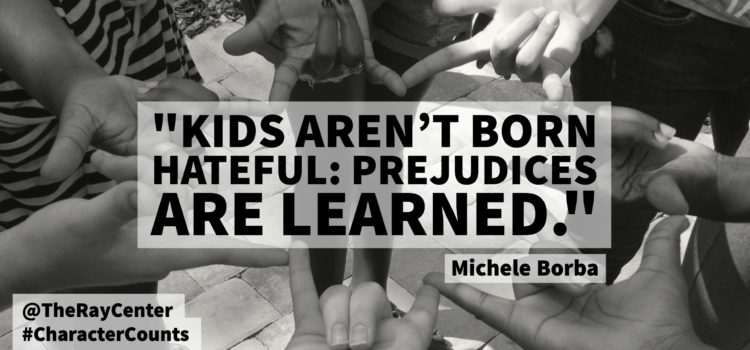
From our guest contributor, Michele Borba.
1. Confront Your Own Prejudices
The first step to nurturing tolerance is to examine your own prejudices and reflect on how you might be projecting those ideas to your child. Chances are that you are communicating those attitudes to your child.
You might begin by reflecting on your own childhood upbringing: What were some of your parents’ prejudices? Do any of those remain with you today?
Take time to reflect on how you might be projecting those old, outdated ideas to your child. Then make a conscious attempt to temper them so that they don’t become your child’s prejudices. Sometimes you might not even know you are tainting your children’s views.
2. Commit to Raising a Tolerant Child
Parents who think through how they want their kids to turn out usually succeed simply because they planned their parenting efforts. So if you really want your child to respect diversity, you must adopt a conviction early on to raise him to do so. Once your child knows your expectations, he will be more likely to embrace your principles.
Children who grow to become tolerant are generally raised in families where there are three conditions: strong parental love and warmth, consistent discipline and clear models of moral behavior. It’s when those needs are not met that prejudice develops.
3. Help Your Child Develop Identify and Pride in His Culture
The starting place to help children understand diversity is for them to look at their own ancestry.
The family is where children not only receive experience a sense of belonging but also acquire their primary language, their knowledge of their ethnicity, their spiritual or religious beliefs, and their values. It is through this membership that kids define their identity and develop pride in their cultural heritage.
Learning about their family background helps children connect with their past and develop an appreciation and respect for not only their own national and ethnic background but also for those of their friends and classmates.
So help your child understand his heritage and as well as begin to appreciate just how much the world is a melting pot of different customs and ideas.
4. Refuse to Allow Discriminatory Comments
When you hear prejudicial comments, verbalize your displeasure. How you respond sends a clear message to your child about your values:
“That’s disrespectful and I won’t allow such things to be said in my house,” or “That’s a biased comment, and I don’t want to hear it.”
Your child needs to hear your discomfort so that she knows you really walk your talk. It also models a response she should imitate if prejudicial comments are made in her presence.
5. Embrace Diversity
From a young age, expose your child to positive images-including toys, music, literature, videos, public role models, and examples from TV or newspaper reports-that represent a variety of ethnic groups. Encourage your child, no matter how young, to have contact with individuals of different races, religions, cultures, genders, abilities, and beliefs. The more your child sees how you embrace diversity, the more prone he’ll be to follow your standards.
6. Emphasize WE Not ME
Encourage your child to look for what he has in common with others instead of how he is different. A key is raising a tolerant, empathetic child is to stress: WE, not ME.
Any time your child points out how she is different from someone, you might say. “There are lots of ways you are different from other people. Now let’s try to think of ways you are the same.”
One fun way to foster tolerance in your child is to play as a family a simple game called “Alike and Different.” It begins by having family members form pairs. Tell each pair to think of five ways they are alike and five ways they are different. Answers can be written or drawn. “Alike” answers might be, for example, “We are African-American, Baptist, dark haired, brown eyed, sisters, and Williams family members.” “Different” answers could be, for example, “I like soccer, she likes tennis; I play saxophone, she plays violin; I am a fourth grader, she is a second grader; I am 4’5″, she is 4’2″.”
In a larger family, have each twosome report their findings back to the family. From then on, any time your child points out how she is different from someone, you might say. “Yes, there are lots of ways you are different from other people. Now let’s try to think of ways you are the same.”
7. Give Straightforward, Simple Answers to Questions About Differences
Kids are naturally curious, so you should expect questions about differences. Asking questions is one way for them to sort out how they are different or the same from others as well as to learn to feel comfortable with those differences.
8. Counter Discriminatory Beliefs
When you hear a child make a prejudicial comment, listen to find out why he feels the way he does. Then gently challenge his views and point out why they are incorrect. For example if your child says,
“Homeless people should get jobs and sleep in their own houses.” You might counter: “There are many reasons homeless people don’t work or have houses. They may be ill or can’t find jobs. Houses cost money, and not everyone can pay for one.”
9. Live Your Life as an Example of Tolerance
The best way for your child to learn tolerance is for him to watch and listen to your daily example. So ask yourself each day one critical question: “If my child had only my behavior to copy, would he be witnessing an example of what I want him to emulate?”
Make sure you are walking your talk.
10. Sensitivity, Empathy and Tolerance Must Be Nurtured
Hatred, bigotry, prejudice, and intolerance can be learned, but so too can sensitivity, understanding, empathy, and tolerance. Although it’s certainly never too late to begin, the sooner we start, the better the chance we have of preventing insidious, intolerant attitudes and behaviors from taking hold.
Remember: kids aren’t born hateful: prejudices are learned. While intolerance, insensitivity, and hatred can be learned, so too can sensitivity, understanding, empathy, and tolerance.
If today’s children are to have any chance of living harmoniously in this global world, it is critical that parents and teachers nurture empathy and tolerance. They are the best, and over-looked antidote to racism, bullying and peer cruelty.
We must be the change for our children.
Dr. Michele BorbaMichele Borba is an educational psychologist, parenting expert, TODAY show contributor and author of 22 books including The Big Book of Parenting Solutions: 101 Answers to Your Everyday Challenges and Wildest Worries and UnSelfie: Why Empathetic Kids Succeed in Our All-About-Me World.
Check out: micheleborba.com or follow me on Twitter @micheleborba.
Click here for more information on character education.



